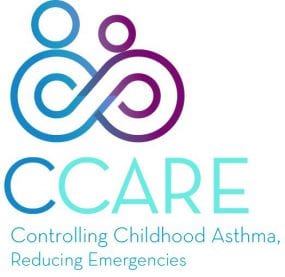Key points
- The objective of CCARE is to reduce asthma-related emergency department visits.
- By leveraging CDC and partner data, CCARE will work with a multi-agency group of organizations and health care providers to improve our collective understanding of asthma and its impact on families, individuals, and the general public.

What it is
CCARE, Controlling Childhood Asthma and Reducing Emergencies, is CDC’s objective of preventing 500,000 Emergency Department (ED) visits and hospitalizations due to asthma by August 31, 2024.
The reason
About 6 million children in the United States ages 0-17 years have asthma. More than half of all children with asthma had 1 or more asthma attacks in 2016. Every year, 1 in 6 children with asthma visits the emergency department and about 1 in 20 children with asthma are hospitalized for asthma.
Goals
Starting September 1, 2019, CDC is using CDC and partner data to track our progress in reaching interim targets on the way to reaching our final objective. Children who visit the ED or urgent care, or who are hospitalized, are children whose asthma is not well-controlled. By tracking reductions in these visits and hospitalizations we can track improvements in the health of children with asthma.
How we operate
CDC NACP role
CDC’s National Asthma Control Program (NACP) works to help Americans with asthma achieve better health and improved quality of life. The program funds states, territories, cities, school programs, and non-government organizations to help them improve surveillance of asthma, train health professionals, educate individuals with asthma and their families, and explain asthma to the public.
CDC's role
CDC NACP leads a multi-agency group of federal and state, territorial and local partners, medical professional organizations, non-governmental organizations, school health organizations, health insurers and providers, and others who help children with asthma in this nationwide effort.
We work to increase coordination among these partners and to encourage partners who provide evidence-based interventions, outlined in CDC’s “EXHALE” technical package, to expand their work to reach more children. We also support partners who are working to develop policies that will improve access to quality care and lower the cost of asthma care for children.
